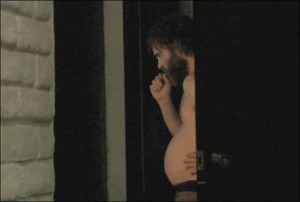I’m Still Here
 Andy Kaufman was* hilarious. But only in retrospect. If you went to a comedy club and had to sit through one of his on-stage readings of The Great Gatsby, it’s a very reasonable response to heckle him and eventually leave. Such meta-commentary on the notion of entertainment and the expectation of a comedian performing for an audience, as opposed to simply amusing himself, would be funny from outside of the bubble of the experiment, but torture if you were the butt of the joke. Kaufman took a comedian’s greatest fantasy; that they could control the crowd so much as to repeatedly annoy and delight them at will, as if they were simply marionette puppets. Milos Forman’s biopic of Kaufman, Man on the Moon, was little more than a greatest hits package of Kaufman’s more infamous antics, and only brushed against his profound sincerity about his insincerity and how much he cared about receiving the most vitriol he could from the crowd.
Andy Kaufman was* hilarious. But only in retrospect. If you went to a comedy club and had to sit through one of his on-stage readings of The Great Gatsby, it’s a very reasonable response to heckle him and eventually leave. Such meta-commentary on the notion of entertainment and the expectation of a comedian performing for an audience, as opposed to simply amusing himself, would be funny from outside of the bubble of the experiment, but torture if you were the butt of the joke. Kaufman took a comedian’s greatest fantasy; that they could control the crowd so much as to repeatedly annoy and delight them at will, as if they were simply marionette puppets. Milos Forman’s biopic of Kaufman, Man on the Moon, was little more than a greatest hits package of Kaufman’s more infamous antics, and only brushed against his profound sincerity about his insincerity and how much he cared about receiving the most vitriol he could from the crowd.
 Oddly enough, Casey Affleck’s I’m Still Here is a better exploration of Kaufman than the movie’s actual subject, “troubled” actor Joaquin Phoenix. That’s an advantage because the question of whether or not I’m Still Here is a hoax and Phoenix’s retirement from acting to become a rapper is legit, will be relevant for about, at most, the next three weeks.
Oddly enough, Casey Affleck’s I’m Still Here is a better exploration of Kaufman than the movie’s actual subject, “troubled” actor Joaquin Phoenix. That’s an advantage because the question of whether or not I’m Still Here is a hoax and Phoenix’s retirement from acting to become a rapper is legit, will be relevant for about, at most, the next three weeks.
 Phoenix’s stunts on The Late Show With David Letterman, appearing medicated, humorless, and disoriented were interesting at the time, if only as a reminder of Joaquin’s brother River overdosing at the age of 23, and how the emotional swings and addiction might be hereditary. Of course, by the time I’m Still Here was finally released a few days ago, it had been eighteen months since Phoenix’s appearance on Letterman’s show, quite a long time ago in terms of pop culture relevance (and why would anyone see the movie if they weren’t eminently familiar with the incident? The movie is like inside-inside baseball). It’s both unfortunate and fortunate that most of I’m Still Here is a build-up to the Letterman debacle, because it’s not much of an event to focus on and it also gives us a chance to get to the genesis of how and when Phoenix and Affleck decided to document his career transition. There have been far more entertaining and memorable stunts pulled on Letterman’s show, a lot of them involving Andy Kaufman (no doubt part of Joaquin and Casey’s conception) where Letterman was in on the joke, and one where he didn’t, with Crispin Glover, in character for his then-upcoming film Rubin & Ed, with Glover, after nearly kicking Letterman in the face, being escorted off the stage.
Phoenix’s stunts on The Late Show With David Letterman, appearing medicated, humorless, and disoriented were interesting at the time, if only as a reminder of Joaquin’s brother River overdosing at the age of 23, and how the emotional swings and addiction might be hereditary. Of course, by the time I’m Still Here was finally released a few days ago, it had been eighteen months since Phoenix’s appearance on Letterman’s show, quite a long time ago in terms of pop culture relevance (and why would anyone see the movie if they weren’t eminently familiar with the incident? The movie is like inside-inside baseball). It’s both unfortunate and fortunate that most of I’m Still Here is a build-up to the Letterman debacle, because it’s not much of an event to focus on and it also gives us a chance to get to the genesis of how and when Phoenix and Affleck decided to document his career transition. There have been far more entertaining and memorable stunts pulled on Letterman’s show, a lot of them involving Andy Kaufman (no doubt part of Joaquin and Casey’s conception) where Letterman was in on the joke, and one where he didn’t, with Crispin Glover, in character for his then-upcoming film Rubin & Ed, with Glover, after nearly kicking Letterman in the face, being escorted off the stage.
 Being familiar with these details helps carry a viewer past the more self-indulgent portions of I’m Still Here (way too long at nearly 2 hours, and concluding with a wordless Terrence Malick-style sequence), which is almost a necessity if you’re going to explore the tediousness of fleeting fame and the difference between being an artist and a joke. The deadpan humor, not normally one of Phoenix’s strengths, is what really comes through, especially in his disinterest in personal hygiene coupled with his shyness, tempered with coke-fueled desperation, unkempt hair and beard, and quickly bloating body, gives him the look of Zach Galifianakis, but the demeanor of an early, stage-averse-period Jim Morrison.
Being familiar with these details helps carry a viewer past the more self-indulgent portions of I’m Still Here (way too long at nearly 2 hours, and concluding with a wordless Terrence Malick-style sequence), which is almost a necessity if you’re going to explore the tediousness of fleeting fame and the difference between being an artist and a joke. The deadpan humor, not normally one of Phoenix’s strengths, is what really comes through, especially in his disinterest in personal hygiene coupled with his shyness, tempered with coke-fueled desperation, unkempt hair and beard, and quickly bloating body, gives him the look of Zach Galifianakis, but the demeanor of an early, stage-averse-period Jim Morrison.
That’s not to say that Phoenix has any of the musical talent of Morrison, his rapping is comically low-energy (he’s lucky that Joaquin rhymes with spleen), it’s appropriate that the white whale to his Captain Ahab is Sean P. Diddy Combs, surely the most successfully ineffectual rapper of the last 30 years. It’s not particularly believable that Phoenix, a veteran of show business, wouldn’t take the hint that Combs wasn’t interested in producing his music after being repeatedly avoided. This lack of control and utter panic around his handlers and management is briefly amusing as a way to humanize Phoenix, but his stage struggles (there’s a very obvious reference to This is Spinal Tap as Phoenix is unable to find the proper exit door) lean more towards the movie being a joke than a legit documentary.
 There are plenty of other hints too, there’s a fight about breaking confidentiality agreements (why would you need such a contract if you weren’t hiding something?), the closing credits has certain people credited as actual characters with totally different names, and Joaquin’s final film was Two Lovers, suggesting that I’m Still Here might have been part of a two-picture deal with Magnolia. But it doesn’t really matter whether or not what we are seeing is real or staged; Phoenix was a mannered actor on screen, and he’s stiff and mannered here too, even during his Phil Hoffman-esque breakdown, as he tearfully repeats, “I’m such an idiot.” That’s where a lot of what makes I’m Still Here so funny comes from, Phoenix wants to appear as an everyman, but we see a pampered, spoiled, arrogant fool who teaches us that the primary responsibility of a handler is to hold your tie while you puke in a toilet. No matter where he is, he acts like he’s still on a set, jittery, impatient, and bursting at the seams with hostile insecurity. Where do the layers of self-awareness and mockery end and where does a truthful portrayal begin in I’m Still Here? I neither know nor care, but I’m pretty sure that whether or not Phoenix comes out of retirement or fatally ODs, I’m Still Here will always be moderately intriguing. In retrospect.
There are plenty of other hints too, there’s a fight about breaking confidentiality agreements (why would you need such a contract if you weren’t hiding something?), the closing credits has certain people credited as actual characters with totally different names, and Joaquin’s final film was Two Lovers, suggesting that I’m Still Here might have been part of a two-picture deal with Magnolia. But it doesn’t really matter whether or not what we are seeing is real or staged; Phoenix was a mannered actor on screen, and he’s stiff and mannered here too, even during his Phil Hoffman-esque breakdown, as he tearfully repeats, “I’m such an idiot.” That’s where a lot of what makes I’m Still Here so funny comes from, Phoenix wants to appear as an everyman, but we see a pampered, spoiled, arrogant fool who teaches us that the primary responsibility of a handler is to hold your tie while you puke in a toilet. No matter where he is, he acts like he’s still on a set, jittery, impatient, and bursting at the seams with hostile insecurity. Where do the layers of self-awareness and mockery end and where does a truthful portrayal begin in I’m Still Here? I neither know nor care, but I’m pretty sure that whether or not Phoenix comes out of retirement or fatally ODs, I’m Still Here will always be moderately intriguing. In retrospect.
 * There’s a very low-budget and terminally dull, padded, and wasteful documentary called The Death of Andy Kaufman that briefly argues that his death from lung cancer was a hoax and he would make his return in the near future. But without anything apart from conjecture behind it, the movie gives up on the notion and turns into a low rent and poorly edited recap of his notorious gambits.
* There’s a very low-budget and terminally dull, padded, and wasteful documentary called The Death of Andy Kaufman that briefly argues that his death from lung cancer was a hoax and he would make his return in the near future. But without anything apart from conjecture behind it, the movie gives up on the notion and turns into a low rent and poorly edited recap of his notorious gambits.



